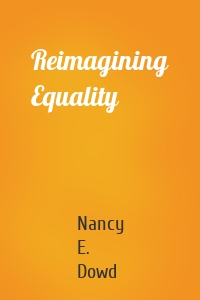Nancy E. Dowd
4 кн.
In Defense of Single-Parent Familie...
Single-parent families succeed. Within these families children thrive, develop, and grow, just as they do in a variety of family structures. Tragically, they must do so in the face of powerful legal and social stigma that works to undermine them. As Nancy E. Dowd argues in this bold and original book, the justifications for stigmatizing single-parent families are founded largely on myths, myths used to rationalize harshly punitive social policies. Children, in increasing numbers, bear the brunt...
| Автор | Nancy E. Dowd |
Redefining Fatherhood
Most fathers parent less than most mothers. Those fathers who do parent equally or more so than mothers are poorly supported by our society. For children this means a loss of adult care, as well as an ongoing and sharply defined differentiation between fathers and mothers. Fathers are not present in children's lives to a significant degree, if at all, or when they are present, they are often rendered socially invisible. For many men, their parenthood is defined as biological or economic,...
| Автор | Nancy E. Dowd |
Reimagining Equality
2018 Outstanding Academic Title, given by Choice Magazine [/b] A comprehensive examination of developmental inequality among children [b] Developmental equality–whether every child has an equal opportunity to reach their fullest potential–is essential for children’s future growth and access to opportunity. In the United States, however, children of color are disproportionately affected by poverty, poor educational outcomes, and structural discrimination, limiting their potential. In ...
| Автор | Nancy E. Dowd |
The Man Question
Among the many important tools feminist legal theorists have given scholars is that of anti-essentialism: all women are not created equal, and privilege varies greatly by circumstances,particularly that of race and class. Yet at the same time, feminist legal theory tends to view men through an essentialist lens, in which men are created equal. The study of masculinities, inspired by feminist theory to explore the construction of manhood and masculinity, questions the real circumstances of men,...
| Автор | Nancy E. Dowd |





